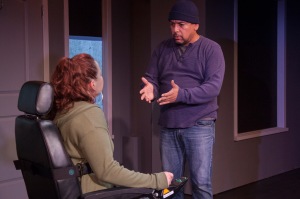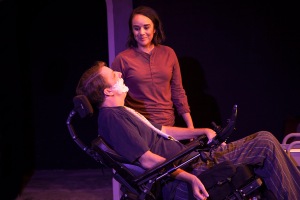
The actual “cost of living” can take on many forms—physical, emotional, financial. In Cost of Living, Martyna Majok’s 2018 Pulitzer Prize-winning play now in its west coast premiere at the Fountain Theatre in Los Angeles, two very different relationships between people with disabilities and their caregivers are examined through a universal lens of privilege, loneliness, and how both affect us all.

Ani (Katy Sullivan, winner of the Drama League Award for originating this role) is 42 years old and was recently in a terrible accident. Now a double amputee and quadriplegic, she very reluctantly accepts an offer of help from her estranged husband, Eddie (Felix Solis), whom she was separated from before the accident. Despite their relationship being totally reframed as Ani adjusts to her new normal, this intimate time together enables them to get to know each other in a way that feels fresh and different, even after over two decades as a couple.

John (Tobias Forrest) has cerebral palsy and is a phD student at Princeton. He hires Jess (Xochitl Romero) to be his caregiver and come by every morning to assist him in showering, dressing, and other tasks. John is rather arrogant and judgmental at first—his previous degree was earned at Harvard, and at first he is super skeptical of Jess, failing to understand why someone who went to Princeton for undergrad is not only applying for this job, but also spending her nights working as a cocktail waitress. Jess is slow to open up, but gradually reveals more about herself and the circumstances that led her to where she is. She and John are each privileged in different ways—Jess does not have to contend with the daily physical challenges John does, but as a first-generation American she has no other family in this country, and struggles to make ends meet. John often mentions that he has plenty of money and a penchant for suing past caregivers who made mistakes, and there are aspects of Jess’s life he struggles to understand at all.

Ultimately, Ani and Eddie’s story is by far the stronger of the two, largely because of their preexisting bond, which comes across marvelously in Sullivan and Solis’s performances. Their arc is moving and heartbreaking, while by the end of the show it remains unclear what, if anything, John and Jess have truly learned from each other. An awkward misunderstanding between them is glossed over without delving into the ramifications, and their tentative relationship never solidifies in any satisfying way. There are times when Majok’s writing truly shines—an opening monologue given by Eddie, or just about any time Ani speaks, her blunt and sassy personality heightened by the grief from her accident. But other times the play feels as if it is circling a few really interesting ideas whereas it might have been better off exploring one more deeply. Loneliness is the theme that rings the most true, especially based on the scenes chosen to bookend the play, but there are moments when this message feels muddled and it is hard to discern what precisely the piece is trying to say.

That being said, the fact remains that simply seeing disabled actors playing people with disabilities—particularly people with disabilities who are also three-dimensional human beings—on stage is still incredibly rare. Directed by John Vreeke, the play does not shy away from portraying every aspect of Ani and John’s lives, even those moments that are brutally intimate and difficult. John’s day starts when Jess arrives at 6am, and as they get to know each other, the audience watches as she shaves his face, helps him in and out of the shower, washes him, and dresses him. Eddie first ends up helping Ani when her nurse cancels one evening, giving her no other choice but to call the one person she begrudgingly knows will still show up for her. While John has a lot of experience living with his disability, Ani does not, and while she may hate to admit it given the resentment she harbors towards Eddie over why their relationship ended, his presence is extremely helpful to her, on a practical level as well as an emotional one. There are times when a more cohesive narrative could make these stories even more powerful, but more importantly, these are stories and perspectives not often seen, and works like Cost of Living are critical in terms of increasing visibility and inclusion in the media for people with disabilities.
Cost of Living runs at the Fountain Theatre through December 16th. Performances are Mondays, Fridays, and Saturdays at 8pm, as well as Saturdays and Sundays at 2pm. Tickets start at $40 with the exception of Monday evenings, which are Pay-What-You-Want subject to availability. The running time is 90 minutes, no intermission. To purchase tickets, click here.
One thought on “Theater Review: Cost of Living at the Fountain Theatre”